At the museum from Ken Roberts on Vimeo.

Ken's Blog
At the museum
April 26th, 2010Through the mountains
April 26th, 2010Through the mountains from Ken Roberts on Vimeo.
Ken describes a tough day – 110 kilometres, 3,000 feet of climb and a two kilometre poorly lit, pot-holed road tunnel – through the mountains that divide east and west Georgia
Night at the casino
April 24th, 2010Night at the Casino from Ken Roberts on Vimeo.
Ken describes his night staying above a casino, close to the town of Kutaisi in western Georgia. Watch out for the cameo appearance by the very helpful Russian housekeeper
Travel advice
April 23rd, 2010I’d planned to push on through the mountains that separate east and west Georgia, heading for the town of Khashuri. But not today. Torrential rain. You’d be forgiven for thinking this sounds a bit weak and, ordinarily, I’d agree. The traffic is bad enough in the dry, but in these conditions, visibility reduced significantly by the spray alone, it’d be positively dangerous. I’ve quite a few years cycle commuting into central London, have ridden into Istanbul, so reckon I know genuine risk when I see it.
Add in unlit mountain tunnels, poor road surfaces and quite a few vehicles with bald – and I do mean absolutely no tread – tyres, and perhaps you can see why I’ve decided to wait for conditions to improve. Which should be tomorrow, fingers crossed. Forecast I use has been very reliable so far.
Besides, wouldn’t want to miss the run down from the mountains to Tbilisi. Foreign Office travel advice has quite a bit on this stretch. Kidnapping, local volunteer militia, unspecified criminal activity. Only bit they seemed to have omitted are the refugee camps from the recent conflict with Russia. Fortunately, much of the route is now a motorway so it should be fairly quick. And, yes, you can cycle on the hard shoulder. Or at least, it’s not against the law.
In the meantime, there’s always things to be done, clothes to wash, inner tubes to repair, interspersed with mugs of tea and coffee thrust my way by the friendly Russian housekeeper. Encouraging me to speak Russian as well. If only the phrase book included the expression for ’I really couldn’t manage a fourth fifth doughnut. No, really’. Definitely need to hit the road tomorrow, calories to burn.
In the news…
April 23rd, 2010
From the moment I first saw it, I thought the Georgian script quite beautiful, and have been looking around for a few more examples to help show this. Road signs perhaps? Which, helpfully, are normally shown transliterated into the familiar Latin alphabet. Or the pages from a book? Actually, I must thank Kate, the journalist I’d met back in Chokhatauri, for providing the solution – a newspaper article with some familiar faces…and car…
[The author is also indebted to Eto for forwarding the article on to me]
Around Guria
April 22nd, 2010Suppose if you start the day with vodka and borsch – red cabbage soup – then things are likely to take a few interesting twists and turns. Especially at speed in the back of a Police car. Meeting up with Eto after breakfast, she’d organised a day out and about in the Guria region with the thoroughness you’d expect of someone who’d spent three years studying at University in Germany.
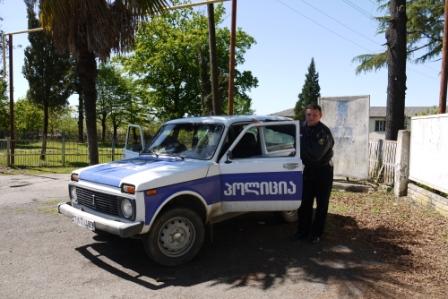
Introduced to the town’s mayor, he kindly put a car and driver at our disposal. A Police car and a Police officer to be precise. Got the impression I was not alone in finding this a generous, but quite unusual, offer. We were joined by Nazi, an English teacher from the local secondary school, helping out with the interpreting.
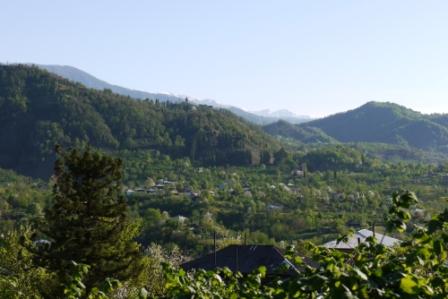
And then we were off. The monastery at Udabno, a few kilometres away, a mix of old and new, a sixth century cave church close to one built just a few years ago. Then on to Eristaven Castle, sat on a small hill in the middle of the flood plain, by now joined once more by Kate the journalist. Then up a winding river valley to the springs at Nabeghlavi and a state-of-the-art bottling plant. Next, a nearby nunnery, high above the valley, the views quite breathtaking.

Finally, a visit to an old house, complete with wine cellar, home of the local landowner in pre-Communist times. Grand piano in the public room, pictures on the wall of the family in the finery. And a fine end to the day, dinner on the veranda in the warm evening sun.
Back at Luara’s time to reflect on the day. What did I make of the Guria region? As I sought to explain to Kate over dinner, the scenery is unspoiled, quite beautiful – intriguingly, you never fail to sense the presence of the snow covered Lesser Caucasus high above the valley. But what I really liked was the genuine warmth, the generosity of people. Even in a busy town like Ozurgeti, cups of coffee had appeared as I sought to explain my venture, I’d been stopped regularly on the road, asked if I needed help.
I’d suggested lots of people would love to visit, be it trekking, bird-watching, cycling, but they simply weren’t aware. I guard my ’visit again’ list quite closely. Very easy to say, with the best of intentions, you’ll return, only for the realities of life to get in the way. But I’d definitely come back, to western Georgia certainly, once the expedition’s complete. Well worth the effort.
[The author is hugely indebted to all those who’ve made him so welcome in Chakhatauri and the Guria region, in particular Eto, Nazi, Luara, Kate, George and Giorgi. And do visit the Gallery to see more photographs of his day in Guria]
At the homestay
April 22nd, 2010At the homestay, western Georgia from Ken Roberts on Vimeo.
In the small town of Chakhatauri, in the Guria region of western Georgia, Ken describes breakfast with a difference
Beyond Batumi
April 22nd, 2010The plan was simple enough. Head north up the coast to Kobuleti, then inland towards the town of Ozurgeti, the hub of Guria region, meeting up with Eto around four in the afternoon. We’d not had chance to agree exactly we’d rendezvous, but I was confident that if I cycled around the place long enough, she’d find me. Thought I’d be easy to spot, couldn’t be that many Englishmen on bikes looking lost. Worked quite well. Actually, when I arrived in the centre I spotted a TV cameraman, and made straight for him. Struck me as a good idea, he even filmed me for a while but then disappeared. Never worked out who he was, and nobody else seemed to know either.
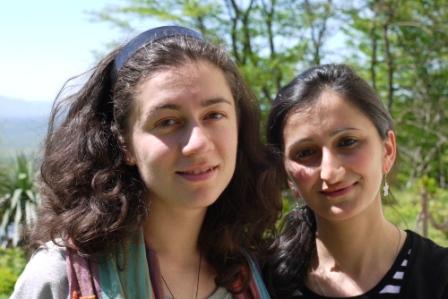
Eto – on the left in the photograph – explained they’d been a slight change of plan, I’d be staying twenty miles further on in the small town of Chakhatauri, close to where she lived. Her father George had brought the car so there was no need to cycle. Unfortunately, three people, Emma, all my panniers and a Lada wasn’t going to work, so we compromised – they’d take the luggage and I’d cycle there.
But, by now five in the evening, it was first time for dinner and a new dish – Khinkali – described by Georgians as a meal in itself because it contains meat and potatoes in a pasta parcel. Just like the Khachapuri Merab had introduced me to back in Batumi, there’s an art to eating this. You must make sure the juice inside the parcel does not spill out, gingerly biting a small nick and drinking the contents. Sounds simple enough. Took three attempts to get right.
The ride to Chakhatauri was swift, Eto and her father meeting me every few kilometres, and the scenery quite beautiful. A brief climb up from Ozurgeti, then a fast, winding descent onto a wide, flat river flood plain, bounded by steep wooded mountainsides and snow covered peaks on the southern side, the Lesser Caucasus, the sun setting behind me.
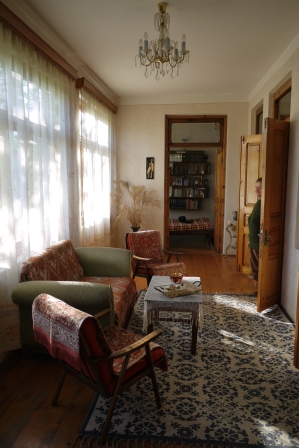
It had been an intriguing day, an unexpected but enjoyable ending, but it wasn’t quite over. Eto had arranged for me to stay in the village with Luara, more of a home stay than a bed and breakfast. Greeted with tea and cake, one last thing to do before retiring, an interview with local journalist Kate, Eto acting as interpreter and George offering a few questions of his own. Intrigued to know what would happen if I fell in love along the way. Thought my answer very diplomatic.
A taste of Batumi
April 22nd, 2010The Black Sea resort of Batumi had been a favourite of the Russian Politburo, and Stalin, himself a son of Georgia. Probably explained the apparent lack of hideous concrete monstrosities often associated with the former Soviet Union. But this is a city undergoing a lot of change, seeking to transform itself into a modern holiday destination. The Sheraton Hotel opens shortly, with other international names to follow. Modern casinos have appeared, drawing in gamblers largely from Turkey. Las Vegas of the Caucasus? No, the city has substance, a pleasing architecture, the new largely blending with the old.
But I was much more interested in getting a sense of what it was to be Georgian. Dinner the previous evening provided a little insight, host Kurt acting as the Tamadan – toastmaster – a role he seemed very accomplished in. There are at least seven toasts, and can be as many as twenty, so it’d seemed wise to opt for Georgian wine rather than vodka. My recollections are a little blurred, but peace, friendship, family are very important. And the welcome I’d had, from the moment I crossed the border, seemed to confirm this.
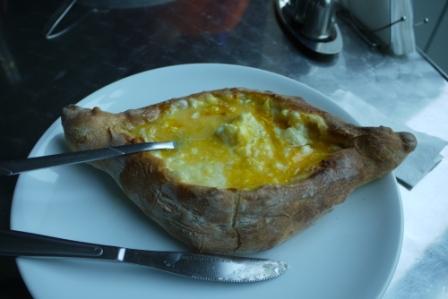
They’d been a good deal of Georgian dishes to sample over dinner, but Merab, my host once more the following day, was insistent we try the local form of khachaprui, a bread shaped like a boat and filled with eggs, cheese and butter. The trick is to mix the contents thoroughly so they ressemble scrambled eggs, then tear off pieces of bread and eat the whole lot with your hands. Some scope for improvement on my part. Calorific content? Thousands apparently.
I’d enjoyed Batumi, there’d been a fantastic, almost humbling, welcome. But I needed to head north-east into the Guria region, making my way towards the route through the mountains that divide east and west Georgia.
[The author is indebted to the warmth and generosity of those who have made him so welcome at the border, and in Batumi, especially Merab from Batumi Business School, Shota Rustaveli State University, Kurt, and Vadja from the city’s tourism organisation]
Europe or Asia?
April 22nd, 2010I’d thought it a simple question, one I’d scribbled in my notebook back in eastern Turkey. Republic of Georgia – Europe or Asia? After all, back in Istanbul, cross the Bosporus from the west and you’re in Asia Minor, no doubt about that. But Georgia? Joining my hosts Merab, Kurt and Vadja for dinner in Batumi, it was abundantly clear that Georgians firmly consider themselves to be Europeans.
I thought their reasoning pretty compelling. For one thing, they asserted, they didn’t look like their Asian neighbours, much more like Europeans. And, like much of Europe, they were a predominantly Christian country, the Georgian Orthodox Church the dominant religion. And what I’d seen so far of western Georgia reminded me quite a bit of former Eastern Bloc countries like Serbia and Bulgaria, albeit with an unexpectedly different, sub-tropical, climate. Quite a few palm trees amongst those I’d expect of a more temperate region, finding oranges, kiwis, even tea, growing along the Black Sea coast.
Persuasive cultural arguments for being European, but there was also a political dimension, Georgia keen to join the European Union, aligning itself with the west. As for the geographical dimension, do you draw the line at the Great Caucasus Range that borders the country to the north, or the Lesser Caucasus to the south? Whatever the answer is, I’d don’t remember the continents being so confusing at school. Happy days.
